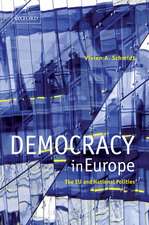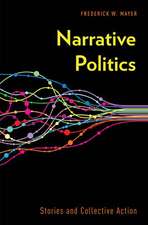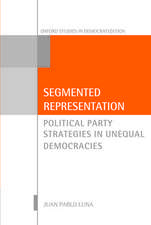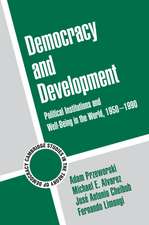Social Capital and Democratisation: Roots of Trust in Post-Communist Poland and Ukraine
Autor Martin Åberg, Mikael Sandbergen Limba Engleză Paperback – 25 sep 2017
| Toate formatele și edițiile | Preț | Express |
|---|---|---|
| Paperback (1) | 188.49 lei 6-8 săpt. | |
| Taylor & Francis – 25 sep 2017 | 188.49 lei 6-8 săpt. | |
| Hardback (1) | 499.70 lei 6-8 săpt. | |
| Taylor & Francis – 28 mar 2003 | 499.70 lei 6-8 săpt. |
Preț: 188.49 lei
Preț vechi: 232.77 lei
-19% Nou
Puncte Express: 283
Preț estimativ în valută:
36.07€ • 39.17$ • 30.30£
36.07€ • 39.17$ • 30.30£
Carte tipărită la comandă
Livrare economică 22 aprilie-06 mai
Preluare comenzi: 021 569.72.76
Specificații
ISBN-13: 9781138277816
ISBN-10: 1138277819
Pagini: 348
Dimensiuni: 153 x 219 mm
Greutate: 0.64 kg
Ediția:1
Editura: Taylor & Francis
Colecția Routledge
Locul publicării:Oxford, United Kingdom
ISBN-10: 1138277819
Pagini: 348
Dimensiuni: 153 x 219 mm
Greutate: 0.64 kg
Ediția:1
Editura: Taylor & Francis
Colecția Routledge
Locul publicării:Oxford, United Kingdom
Cuprins
Contents: Introduction: Social capital and post-communist democratization: a dynamic case study approach. Path Dependencies in Perspective: The regions: civic traditions and social capital; Post-war transitions. Post-Communist Patterns: Trust and political confidence in Wroclaw and L’viv; Local elites, care-taking and trust; Parties, political capital and evolution of democratic beliefs; Constitutions, political capital and trust: comparing the Polish and Ukrainian cases. Social Capital and Democracy: Lessons and Propositions: Roots of trust and paths of post-communist democratization; Appendix; Bibliography; Index.
Recenzii
'This book can be highly recommended to all those interested in understanding the deeper roots of the transformation process in Central and Eastern European countries. It is an excellent study of the interplay between the often neglected historical factors and contemporary political and economic developments. Additionally, its regional perspective reveals the previously unexplored complexity of the patches of development of social capital in the countries of the region.' Dr Tomasz Zarycki, Warsaw University, Poland 'This book represents a thought-provoking combination of original theoretical ideas, and a wealth of data on various aspects of the post-Communist political evolution in Poland and the Ukraine. Through an in-depth analysis of two cities, the authors are able to draw an unusually nuanced and multi-faceted picture of the democratization process.' Professor Christer Jönsson, Lund University, Sweden 'All historians of the region know that the fates of Poland and Ukraine have been closely tied over a millennium. Since 1991, for the first time in centuries, these two nations are living side by side as good neighbours and each in its own way is trying to build a post-Communist, democratic and pluralistic society. This is a remarkable study of two nations in their post-Communist eras - we need such works to allow a deeper understanding of a region well into its second decade on a new and uncharted path. This work is not only essential reading for social and political scientists, students of current affairs, and all those engaged in relations with Poland and Ukraine...it deserves to be read also by all those who want to get a deeper insight into two societies with so much of a common past and yet so very different.' Professor Roman Szporluk, Harvard University, USA 'The authors' in-depth analyses of trust at the local and national levels provide an important contribution to the existing literature on democratic consolidation, particularly for states where t
Descriere
Contributing an impressive historical basis for path dependency analysis and the role of social capital in newly established democracies, this book offers a fascinating and ground-breaking analysis of the role of social capital in the democratic context of Eastern Europe.
















